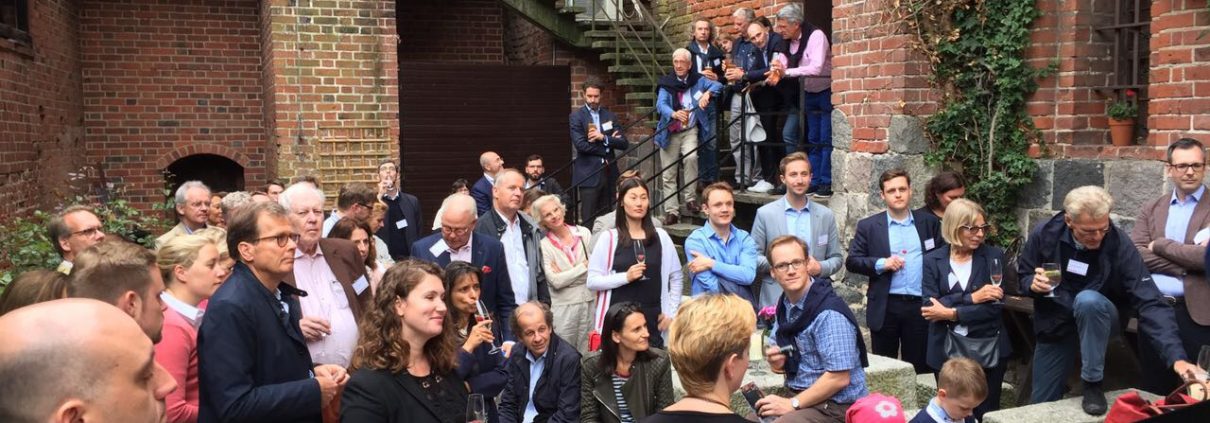IX Young Leaders Alumni Conference
Gdansk, Poland
July 6 to 9, 2017
“Bridges or Chasms between East and West? – A Polish Case Study”
At the point where Poland meets the Baltic Sea, our Young Leaders and Global Bridges members dedicated three days of stimulating debate, study visits, and sightseeing to the (re-)discovery of Gdansk. Fueled by the enthralling speeches given by the guest speakers, the discussions focused on Poland’s role in international relations, especially to the United States, Russia, Germany, and the rest of Europe. Our delegation’s numerous trips to local historic sites, such as the fortress “Ordensburg Marienburg” (Malbork), the Solidarność Center, as well as the boat ride to “Westerplatte,” the site where World War II began on September 1, 1939, contributed to more lively conversations. These shared experiences in Gdansk blended together with the diverse backgrounds of the trip’s attendants led our Young Leaders to a powerful, common conclusion: it is now more important than ever to build bridges with Poland.
To read the full report, please click here:
Right in the heart of Europe, Poland is a central place in a continent in search of a new geopolitical role. At the crossroads of the 21st century, it represents a point of confluence between East and West, of past memories and future hopes, and of a complex encounter of new and old ideologies and diverse identities in an accelerated technological era. With her extraordinary historic and cultural richness and economic dynamics, the city of Gdansk embodies these complexities. It helps us to understand how important it is to travel, to speak to people, and to experience through our own eyes, not only in order to learn more and make better assessments, but especially to be aware of possible chasms so that we are then capable of building bridges where they are needed most.
Accordingly, an incredible group of “Young Leaders” and Global Bridges members followed the maxim of Global Bridges (and Beate Lindemann): “Wir fahren hin” (we go there). On site, they dedicated three days of stimulating conversations, debate, study visits, and sight-seeing to the (re-)discovery of Gdansk – a key location for the understanding of the numerous contradictions, difficulties, threats, and great opportunities Europe faces today. This was a most interesting endeavour and an equally pleasant gathering that made our 2017 Young Leaders Alumni Conference a wonderful event.
It all started with a warm July welcome reception on Thursday evening, where many of us had the chance to meet again, sometimes after only a few months, sometimes after many years. Yet we always discover that, as time goes by, Young Leaders stay young at heart. As the saying goes, “once a young leader, always a young leader,” and our reunion proved these words to be true. This atmosphere was further underlined by Beate’s most convivial welcome speech, followed by a brief introduction to our conference by Hans Albrecht. It was an incredible privilege to have the honorable Wieslaw Byczkowski, Deputy Marshal of Pomorskie, as our first political speaker, who gave us an extremely honest and thoughtful speech presenting his incredible knowledge of Pomerania (and, of course, Polish) history, culture, and society, while also providing us insight into his fears and expectations of today.
Two plenary sessions and four very intensive discussions panels were dedicated to all of Friday. The general thematic introductions by Ambassador Dr. Marek Prawda (Head of the European Commission Representation in Poland), Gerhard Zeh (Joint Force Training Centre in Bydgoszcz in Poland), Dr. Marco Gutekunst (Deputy Head of Political Division, German Embassy in Warsaw), Aljaž Zupan (Counselor at the Ministry of Foreign Affairs in Slovenia), and, last but not least, Oliver Buck’s final conclusion were highly stimulating and challenged the different groups to a productive debate based on the following topics: “Poland and Europe”; “Poland and the United States”; “Poland and Germany”; and “Poland and Russia.”
The main findings of these very intense debates were diverse, but they shared a common guideline regarding Poland’s crucial role in the political chess table of Europe and the West today: it is more important than ever to build bridges with Poland and to hold on to this valuable partnership tightly.
After our concentrated working sessions, we drove to the fortress “Ordensburg Marienburg” (Malbork), Europe’s largest Gothic brick castle and the seat of the Teutonic Order founded in the 13th Century. The mayor of Malbork guided our group on a travel through time as we traversed the three major connecting castles under the patronage of Holy Mary. He later invited us to a moment of music followed by a delicious dinner conceived by the renowned cook.
Finally, Saturday arrived, a day to discover historic Gdansk. After the reception led by the vice president of Gdansk, Aleksandra Dulkiewicz, we departed by boat to the “Westerplatte,” the site where World War II began on September 1, 1939. Back in Gdansk, we visited the extraordinary Solidarność Center, one of the most impressive living museums of our time, where we discovered the history of the Solidarność Movement in all its past dramatics and future hopes; still, there is so much to be done.
After an afternoon stroll along the Sopot beach and on the famous, long pier, a delicious ice cream, and, of course, great conversations, our conference ended with a fine dinner-buffet at the Sopot Grand Hotel, where we enjoyed a magnificent view of the Baltic Sea, a glass of wine, and more wonderful chats. We thanked the Global Bridges team for this magnificent gathering, and wished all a farewell. Gdansk will certainly stay in our hearts and minds, and Global Bridges on our agenda.


